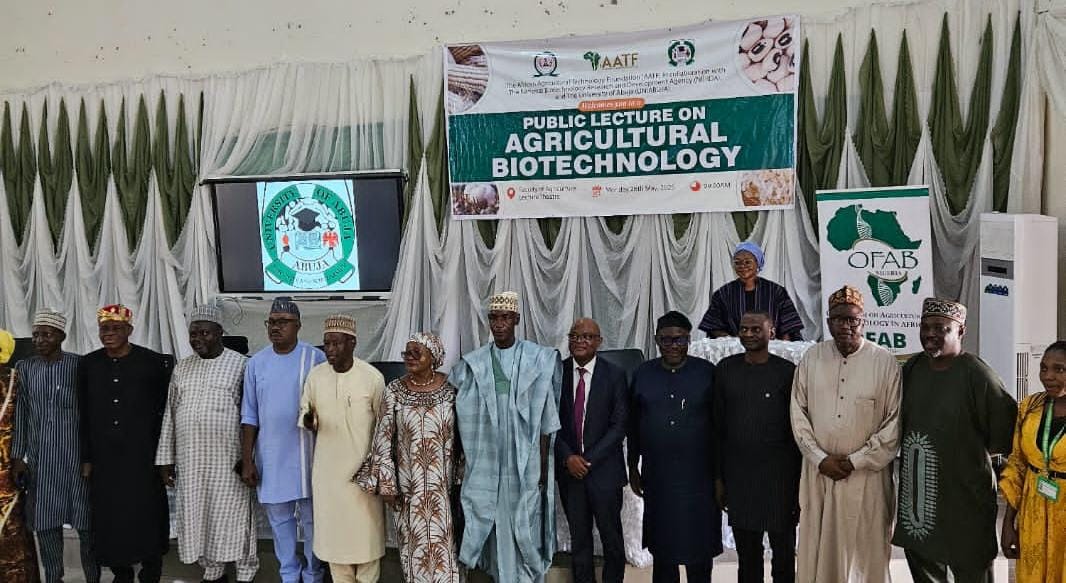The Federal Government has said it would take steps to build public trust in biotech innovations to revolutionise agricultural practices.
The decision was reached in Abuja at a public lecture hosted by the African Agricultural Technology Foundation (AATF) in collaboration with the National Biotechnology Research and Development Agency (NBRDA) and the University of Abuja
The lecture, “Advancing Agricultural Biotechnology for Food Security and Economic Growth in Nigeria,” was attended by policy makers, scientists, stakeholders and industry leaders.
Dr Emmanuel Okogbenin, AATF Director of Product Development and Commercialisation said agricultural biotechnology when responsibly developed and effectively adopted, offers a powerful set of tools that help address challenges.
“Nigeria and Kenya, alongside Ghana, stand out as leaders on the continent, having made significant progress in commercialising biotech crops such as Bt Cotton, Bt Maize and PBR Cowpea.
“These innovations are not just scientific milestones, they represent real opportunities to transform lives, improve farmer livelihoods, and enhance national food systems,’’ Okogbenin said.
Also speaking, the AATF Director, who was represented by Yarama Ndirpaya, AATF Tela Programme Manager/Out-Grower Strategy Lead in Nigeria, said it was imperative to acknowledge hurdles.
According to him, regulatory uncertainties, persistent misinformation and public skepticism continue to slow adoption.
“That is why this forum is so important, it offers a platform for evidence-based dialogue where diverse voices can engage, ask questions, share insights and build common understanding,” he said.
The Director- General of the NBRDA, Prof. Abdullahi Mustapha, said biotech innovations hold promise for tackling agricultural challenges like unrest, stress and pandemics, offering solutions for a better future.
The NBRDA DG, who was represented by Dr. Rose Gidado, Director, Agricultural Biotechnology Department of the NBRDA, disclosed that the lecture would discuss the transformative potential of agricultural biotechnology in Nigeria.
“Through the harnessing of science and technology, we can develop resilient crop varieties, improve pest and disease resistance, enhance nutritional content, all while ensuring that our agricultural practices are sustainable and environmentally friendly.’’
Prof. Patricia Lar, acting vice chancellor of UniAbuja, said agriculture in Nigeria faced monumental challenges, food insecurity, climate change, pest infestations and soil degradation which threaten the livelihoods of millions of smallholder farmers.
She noted that in spite of these challenges, opportunities still existed for innovation, collaboration and transformation, and that the lecture served as a clarion call to action.
Lar, represented by Prof. Ahmed Dan-Kishiya, Dean, Faculty of Science, expressed optimism that the power of agricultural biotechnology could be harnessed in Nigeria, such that no family would go hungry.
“That is why this forum is so important, it offers a platform for evidence-based dialogue where diverse voices can engage, ask questions, share insights and build common understanding,” he said.
Earlier, Vitumbiko Chinoko, project manager, Open Forum on Agricultural Biotechnology (OFAB), outlined the objectives of the lecture.
The lecture aims to strengthen policy and regulatory frameworks, while expanding collaboration and innovation opportunities in agricultural technology.
Highlights of the first session featured expert presentations and a panel discussion on, “The Science of Agricultural Biotechnology: Case of Nigeria with a focus on PBR Cowpea.”
The second session focused on creating an enabling environment for the development of GM crops in Nigeria.”

